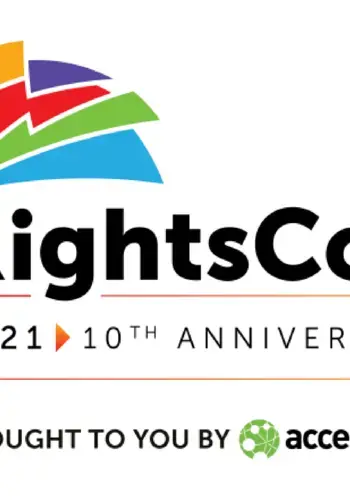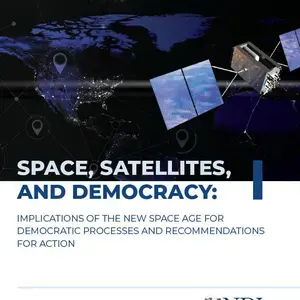Remarks: NDI President Derek Mitchell
RightsCon: Mainstreaming Internet Freedom into DRG Assistance
June 9, 2021
As prepared
Thank you, Dan. Happy to be with you and everyone today. Wonderful as always to work with our IRI friends on these initiatives.
Thank you Amy for organizing this workshop to consider how the DRG community may integrate internet freedom into our work. And in the process I hope to integrate our DRG work into the digital technology space. RightsCon is the perfect venue for discussions like this.
It’s a cliché, but we live in a digital age, where ever-evolving new digital technologies offer incredible opportunities to promote free expression and civic participation in political life.
But that hopeful future is only if we get in the game and recognize that the bad guys have gotten a head start. They’ve figured out how to weaponize and control the digital space much quicker than we have organized and acted to safeguard that space. And the window is closing.
It’s not just the very extreme cases like China or even Myanmar. More and more leaders are seeking to subvert the information space, and strangle democracy. Restrictive internet policies and data laws are being established both in one-party states like Cambodia and in those places where democracy is struggling to emerge or advance, such as in Ethiopia and Nigeria. And many more. Modi’s India is particularly tragic.
At best, we are moving toward a splintered internet environment that could fundamentally alter the way we interact and operate internationally. At worst, new standards and norms are being created against the best interest of democracies.
Fortunately, we’re starting to wake up. In March, a bipartisan coalition in Congress introduced the Democracy Technology Partnership Act to ensure the U.S. government is organized and structured to work with other democracies to shape those digital technology norms, standards and intellectual property rights of the future.
President Biden reaffirmed this goal just last week in an op-ed in which he called on the democracies of the world to work together to ensure that “our values govern the use and development of these innovations — not the interests of autocrats."
I expect this will be a central topic at the G7 later this week. It will no doubt be on the agenda for the administration’s Summit for Democracy.
But the Hard Truth Is, We are only getting started. We are not Ready. I hope this fact motivates the conversation you all will have today.
For one thing, democracy stakeholders don’t have a strategy. And we aren’t in the right rooms. The national security community finally appears to understand the stakes of shaping the norms and standards of the international system - including the digital space - in a way that is consistent with our values. But in thinking about these questions, they fall back on traditional methods and mindsets. And actors.
We need to get into that room and make our presence felt. To leverage the decades of unique experience we all have in the DRG space. There is a unique window for our community to find its collective voice, and help define the standards and norms that will define the digital domain in years to come, alongside the companies, governments, multilateral organizations, and foundations already positioning themselves.
Back in January, Dan and I took part in a briefing for Congressional staff on democracy. At that time, I was asked to comment on the question of digital technology. I proposed four steps.
First, we should REVIEW what we already have in place. I’m sure you’ll do that today, and the State Department’s 60-day review of technology issues is a further step in the right direction. The fact is we have many tools already in train, from programs under the Open Technology Fund, to those we are conducting ourselves.
Second, we need to PREPARE our partners for a splintered internet, and consider the ways 5G, AI and other new technologies in the hands of authoritarian actors could harm the interests of free peoples.
Third, then, we need to COUNTER such tactics of authoritarian actors. Whether it’s through tools that allow citizens and activists to access factual information from the outside, restrict the acquisition, transfer and use of private data, or communicate with one another in closing or closed spaces, this needs to be a top priority.
Finally, as always, we need to EMPOWER our partners. They need the technology, but also the expertise, support and solidarity to withstand the strain.
In all this, we must look to build creative new alliances. Not just with governments or other NGOs, but companies, foundations, individuals.
To my mind, engineers are potentially our biggest allies. We haven’t even scratched the surface of working with technologists who see the harm their forebears have caused and who may direct their talents to help create a more democratic internet and more democratic world.
So I look forward to all of the ideas I know this group might generate today and in the future. Amy, Dan, thank you again for organizing this gathering and the opportunity to weigh in. I look forward to a productive conversation.
With apologies, I will need to leave early for another meeting, but I have asked our NDI team to keep me updated on the proceedings of this week.
Over to you, Amy.
NDI is a non-profit, non-partisan, non-governmental organization that works in partnership around the world to strengthen and safeguard democratic institutions, processes, norms and values to secure a better quality of life for all. NDI envisions a world where democracy and freedom prevail, with dignity for all.



